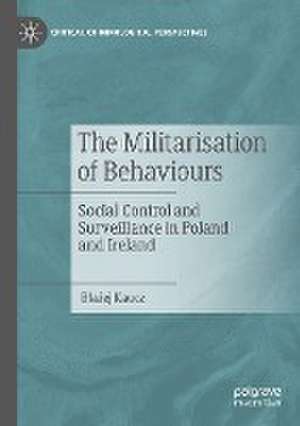The Militarisation of Behaviours: Social Control and Surveillance in Poland and Ireland: Critical Criminological Perspectives
Autor Błażej Kauczen Limba Engleză Paperback – 2 noi 2023
This book examines how historical military influences can become embedded and used by the state to control citizens' behaviour, termed the militarisation of behaviours. It refers to the treatment of citizens by their state in a manner resembling the treatment of soldiers by the army. The militarisation of behaviours is a process of mass social control where the state exercises its powers over the population, blurring the boundaries between a dichotomous divide of civilian and military life. This book focuses on the social process of how Polish post-WWII emergency legislation was normalised and how through it the Polish communist state (from 1943/4 until 1989) introduced and enforced the process of militarisation of behaviours. It discusses the impact of the emergency legislation on the Republic of Ireland as a comparison. It offers a useful lens to understand the social and political processes happening currently in Poland, Ireland, and elsewhere, with the increasing influence ofthe (far) right. This book is situated in the framework of criminology and socio-legal studies.
| Toate formatele și edițiile | Preț | Express |
|---|---|---|
| Paperback (1) | 725.75 lei 6-8 săpt. | |
| Springer International Publishing – 2 noi 2023 | 725.75 lei 6-8 săpt. | |
| Hardback (1) | 730.97 lei 6-8 săpt. | |
| Springer International Publishing – noi 2022 | 730.97 lei 6-8 săpt. |
Din seria Critical Criminological Perspectives
-
 Preț: 324.62 lei
Preț: 324.62 lei - 20%
 Preț: 752.01 lei
Preț: 752.01 lei - 15%
 Preț: 640.06 lei
Preț: 640.06 lei - 18%
 Preț: 730.35 lei
Preț: 730.35 lei - 18%
 Preț: 1003.24 lei
Preț: 1003.24 lei -
 Preț: 391.61 lei
Preț: 391.61 lei -
 Preț: 388.72 lei
Preț: 388.72 lei - 15%
 Preț: 529.92 lei
Preț: 529.92 lei - 15%
 Preț: 641.85 lei
Preț: 641.85 lei - 15%
 Preț: 638.43 lei
Preț: 638.43 lei - 15%
 Preț: 690.44 lei
Preț: 690.44 lei -
 Preț: 398.74 lei
Preț: 398.74 lei - 15%
 Preț: 636.30 lei
Preț: 636.30 lei -
 Preț: 392.37 lei
Preț: 392.37 lei -
 Preț: 384.70 lei
Preț: 384.70 lei - 18%
 Preț: 782.72 lei
Preț: 782.72 lei - 15%
 Preț: 642.51 lei
Preț: 642.51 lei - 18%
 Preț: 1007.03 lei
Preț: 1007.03 lei - 15%
 Preț: 527.32 lei
Preț: 527.32 lei -
 Preț: 446.26 lei
Preț: 446.26 lei - 18%
 Preț: 781.94 lei
Preț: 781.94 lei - 15%
 Preț: 469.22 lei
Preț: 469.22 lei - 15%
 Preț: 693.39 lei
Preț: 693.39 lei - 18%
 Preț: 1001.65 lei
Preț: 1001.65 lei - 18%
 Preț: 726.23 lei
Preț: 726.23 lei -
 Preț: 417.30 lei
Preț: 417.30 lei - 18%
 Preț: 781.62 lei
Preț: 781.62 lei - 15%
 Preț: 703.85 lei
Preț: 703.85 lei -
 Preț: 212.06 lei
Preț: 212.06 lei -
 Preț: 394.51 lei
Preț: 394.51 lei - 15%
 Preț: 640.06 lei
Preț: 640.06 lei - 15%
 Preț: 640.88 lei
Preț: 640.88 lei -
 Preț: 416.71 lei
Preț: 416.71 lei - 18%
 Preț: 1111.22 lei
Preț: 1111.22 lei
Preț: 725.75 lei
Preț vechi: 885.06 lei
-18% Nou
Puncte Express: 1089
Preț estimativ în valută:
138.87€ • 145.36$ • 115.59£
138.87€ • 145.36$ • 115.59£
Carte tipărită la comandă
Livrare economică 31 martie-14 aprilie
Preluare comenzi: 021 569.72.76
Specificații
ISBN-13: 9783031166037
ISBN-10: 3031166035
Ilustrații: XXIII, 300 p. 1 illus.
Dimensiuni: 148 x 210 mm
Greutate: 0.39 kg
Ediția:1st ed. 2022
Editura: Springer International Publishing
Colecția Palgrave Macmillan
Seria Critical Criminological Perspectives
Locul publicării:Cham, Switzerland
ISBN-10: 3031166035
Ilustrații: XXIII, 300 p. 1 illus.
Dimensiuni: 148 x 210 mm
Greutate: 0.39 kg
Ediția:1st ed. 2022
Editura: Springer International Publishing
Colecția Palgrave Macmillan
Seria Critical Criminological Perspectives
Locul publicării:Cham, Switzerland
Cuprins
1. Introduction.- 2. Development of Polish Criminal Law.- 3. Ireland, Church, and Emergency Legislation.- 4. Subduing a Nation Through Military Influences [Militarisation and Demilitarisation].- 4. Elements of Militarisation of Behaviours.- 5.- 6. Conclusions and Recommendations.
Notă biografică
Błażej Kaucz is a researcher in criminology and socio-legal studies. He completed his PhD in criminology in the Department of Sociology and Criminology at University College Cork, Ireland.
Textul de pe ultima copertă
This book examines how historical military influences can become embedded and used by the state to control citizens' behaviour, termed the militarisation of behaviours. It refers to the treatment of citizens by their state in a manner resembling a treatment of soldiers by the army. The militarisation of behaviours is a process of mass social control where the state exercises its powers over the population, blurring the boundaries between a dichotomous divide of civilian and military life. This book focuses on the social process of how Polish post-WWII emergency legislation was normalised and how through it the Polish communist state (from 1943/4 until 1989) introduced and enforced the process of militarisation of behaviours. It discusses the impact of the emergency legislation on the Republic of Ireland as a comparison. It offers a useful lens to understand the social and political processes happening currently in Poland, Ireland, and elsewhere, with the increasing influence ofthe (far) right. This book is situated in the framework of criminology and socio-legal studies.
Błażej Kaucz is a researcher in criminology and socio-legal studies. He completed his PhD in criminology in the Department of Sociology and Criminology at University College Cork, Ireland.
Błażej Kaucz is a researcher in criminology and socio-legal studies. He completed his PhD in criminology in the Department of Sociology and Criminology at University College Cork, Ireland.
Caracteristici
Provides a timely exploration of how states are utilizing tools of social control Discuses why some states might want to employ tools of social control Offers a comparative study, focusing mainly on Poland and Ireland
